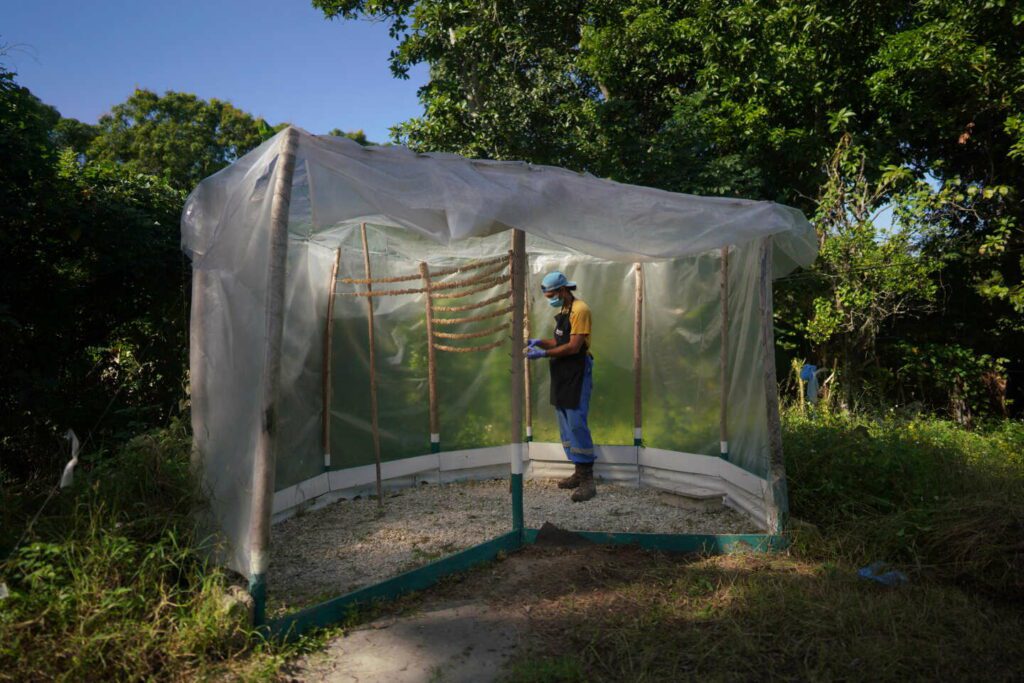An entrepreneur dries banana slices to make flour, on the outskirts of Havana, November 22, 2023. ALEXANDRE MENEGHINI / REUTERS
Behind apartment buildings on the outskirts of Havana, small squares of well-tended land are wedged between rows of banana trees. Sergio’s arms (all names have been changed) were laden down with two buckets of water for his tomato plants. “Tomatoes are a luxury, I don’t eat them, I sell them at a high price,” he said. He took a handkerchief out of his pocket, rubbed it with soap and meticulously removed aphids from the plants: “It would be more effective with chemicals, but there aren’t any. We even run out of soap sometimes.”
Sergio is not a farmer, but a civil servant. However, his plot of land has become a source of income equivalent to the salary he earns from the Ministry of Health. Together with several neighbors, he cleared this bramble-covered plot three years ago, and now they take turns at night to protect their crops from would-be thieves: “The garden is the envy of many in the neighborhood, who don’t have enough to eat. The only free food available is the bananas that grow everywhere. You could say that Cubans are not short of potassium.”
According to the latest food insecurity study carried out by the NGO Food Monitor Program, in 2024, among 2,700 households across all the island’s provinces, 96.27% of people surveyed admitted to having serious difficulties feeding themselves. The same number (96.61%) felt that the libreta, the food rationing booklet given to every Cuban family, was totally insufficient to cover their needs. Today, vegetables and fruit, except for bananas and mangoes, have become particularly rare in their diet.
Read more Subscribers only Cuba is facing its worst social crisis since the collapse of the Soviet bloc
Since the Covid-19 pandemic, and with the establishment of new sanctions by former US president Donald Trump, which have been upheld by Joe Biden, Cuba has been plunged into a serious social crisis. Year-on-year price rises, which had risen to close to 70% at the end of 2021, have fallen back to around 30% in recent months, according to the Cuban statistics institute. Most food is now imported, which has exacerbated inequalities within Cuban society. That’s why small gardens on the outskirts of cities, like the one Sergio and his neighbors have set up, have become so important for improving peoples’ meals and incomes.
Production ‘for export’
In the 1990s, the Cuban government began distributing land under usufruct (a legal right allowing for the use and profit from something, but not its transfer or alteration), in an attempt to revive the country’s agricultural production, which had crashed along with the Communist bloc. “Cuba invested heavily in its agriculture, and, in the 1980s, it was even the most modern in Latin America,” said anthropologist Marie Aureille, a doctoral student at the Ecole des Hautes Etudes en Sciences Sociales (EHESS) and a specialist in Cuban agriculture. “But this production was mainly intended for export, particularly for sugar, tobacco and citrus fruits. Above all, this agriculture has always been highly dependent on agricultural inputs: fuel, seeds and fertilizers. Every time these inputs have been lacking, whether during the fall of the Communist bloc or, more recently, with the Covid-19 crisis, agricultural production has collapsed.”
You have 62.06% of this article left to read. The rest is for subscribers only.
Source link : http://www.bing.com/news/apiclick.aspx?ref=FexRss&aid=&tid=66f5ae996cde4586b13fbea7544ef3d8&url=https%3A%2F%2Fwww.lemonde.fr%2Fen%2Finternational%2Farticle%2F2024%2F09%2F26%2Fcubans-are-looking-for-food-every-day-and-now-water_6727367_4.html&c=2226158943304567343&mkt=en-us
Author :
Publish date : 2024-09-26 06:00:00
Copyright for syndicated content belongs to the linked Source.
